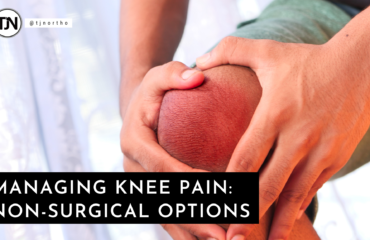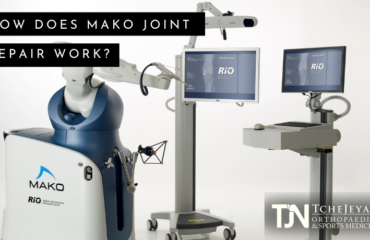Too often, patients avoid a necessary joint replacement surgery for fear of limited mobility and a painful recovery. The truth is, pain management has come a long way in the last few decades, making orthopedic surgery both more accessible and less burdensome to patients.
At TJN Orthopedics, many measures are taken before, during, and after surgery to manage your pain. What used to look like patient-controlled morphine buttons have evolved to multimodal pain management strategies with fewer side effects and quicker outcomes.
There are four primary ways TJN Orthopedics manages surgical pain for patients – spinal blocks, local anesthesia, catheter blocks, and oral medication.
- Spinal Blocks
Spinal blocks are performed by injecting medicine at the spinal nerves that disrupts pain signaling around the body, producing short-term pain relief.
Spinal blocks have come a long way as well. In the past, spinal headaches were a commonly complained about side effect due to the withdrawn needles sealing up the spinal sack. Today, the needle design has greatly improved, allowing spinal blocks to numb patients from the waist down without side effects.
Spinal blocks provide enough anesthesia for pain management during surgery, but the patient would be awake and alert if that was the only measure taken. For this reason, spinal blocks are combined with short-acting propofol – an easily metabolized medicine that puts the patient to sleep.
- Local Injections
Local injections are an equally important pain management tool in orthopedic surgery. While the joint is open post-surgery, local tissue is injected with a long-acting painkiller and anti-inflammatory to create relief at the injection site.
- Catheter Blocks
Catheter blocks are another form of local anesthetic that’s given through a thin flexible tube connected to a medication pump. This tube is inserted adjacent to a nearby nerve and drips lidocaine throughout the procedure. Dr. Tchejeyan uses adductor canal blocks and catchers after knee surgery to help significantly reduce post-surgical pain for up to 4 days.
- Oral Medication
Oral medication has long been a solution for pain management in orthopedic surgery. Dr. Tchejeyan prefers to and begins by administering anti-inflammatory painkillers prior to and during surgery in the IV. Post-surgery, narcotic and/or non-narcotic drugs are usually prescribed to help with post-operative pain.
Pain Management is an important part of the surgical process. Dr. Gregory H. Tchejeyan employs the four above-mentioned methods to ensure a positive patient experience and recovery. Especially with his outpatient cases, Dr. T. ensures that pain is under control before the patient is released. Controlling patient pain before, during, and after surgery is important to the entire staff at TJN Orthopedics. For more information on orthopedics, or to schedule a consultation with Dr. T., contact the office today.



